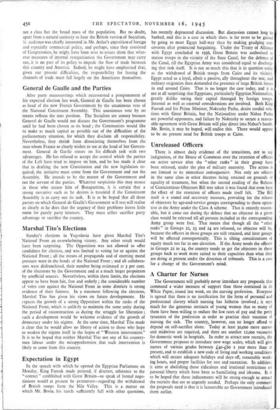Unreleased Officers
There is almost daily evidence of the uneasiness, not to say indignation, of the House of Commons over the retention of officers on active service after the "other ranks" in their group have been released, under the plea of military necessity. The action is not limited to its immediate consequences. Not only are officers in the same class in other theatres being retained on grounds of equality of treatment, but when the second reading of the Release of Conscientious Objectors Bill was taken it was found that even here the effect of the retention of officers made itself felt. The Bill itself is a sound and necessary measure, providing for the release of objectors by age-and-service groups corresponding to those opera- tive in the Army under the Class A scheme. That is entirely reason- able, but it came out during the debate that no objector in a given class would be released till all persons included in the corresponding Army group were free. That means that though all the "other ranks" in Groups 22, 23 and 24 are released, no objector will be, because the officers in those groups are still retained, and later groups will be affected consequentially. This is tilting considerations of equity much too far in one direction. If the Army needs the officers in Groups 22 to 24, the country needs to get the objectors in those groups back to work more suited to their capacities than what they are doing at present under the direction of tribunals. This is a case for a change of the Government's mind.






























 Previous page
Previous page